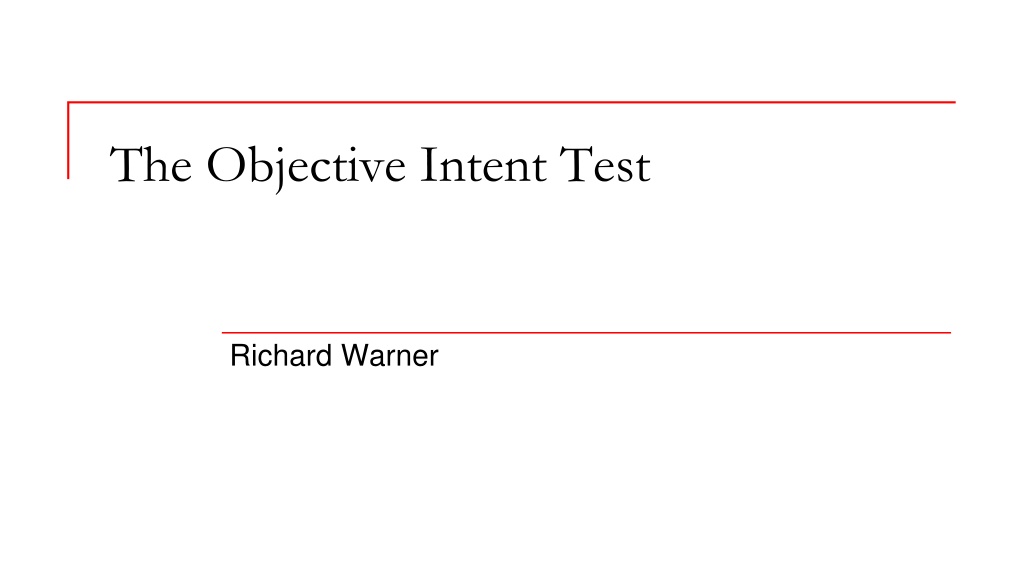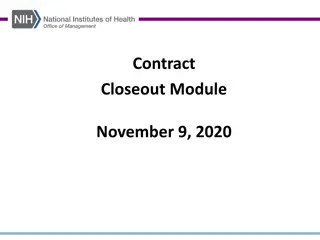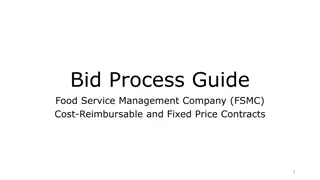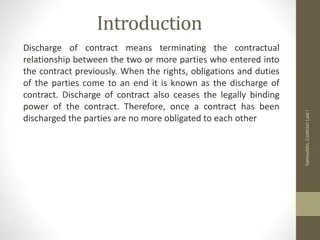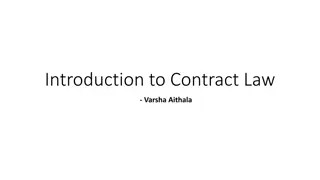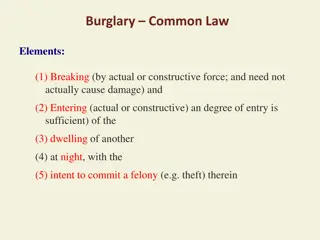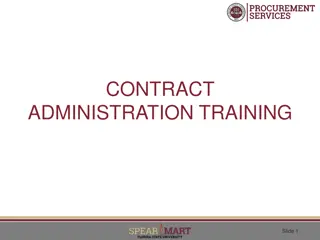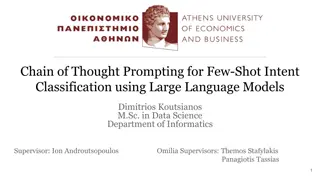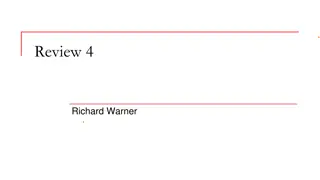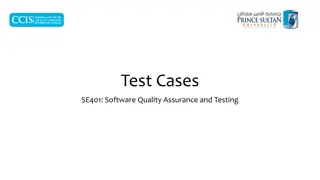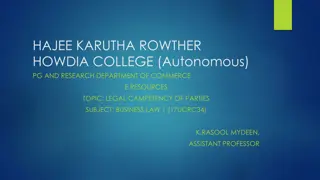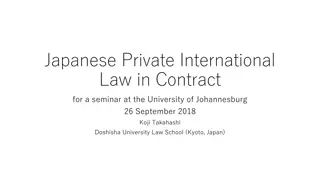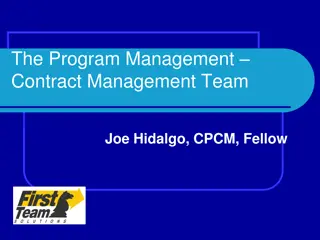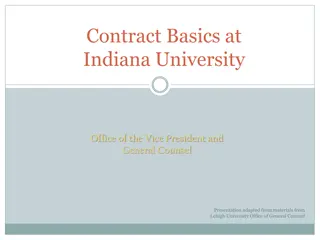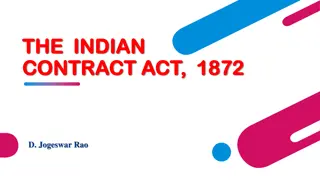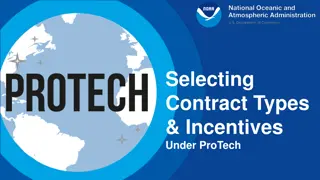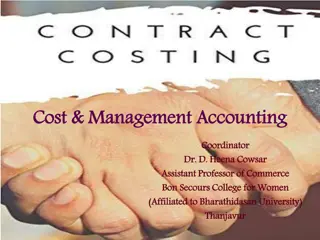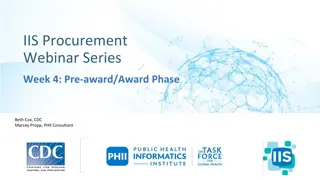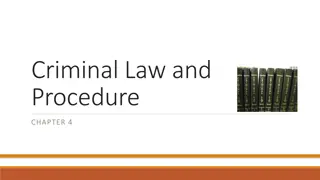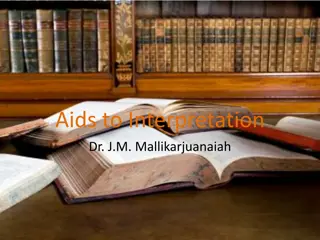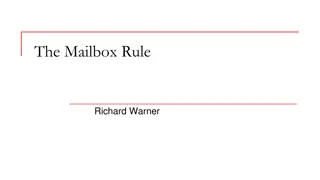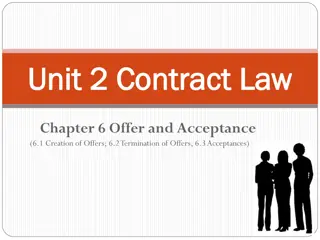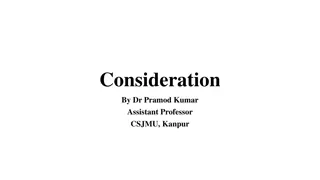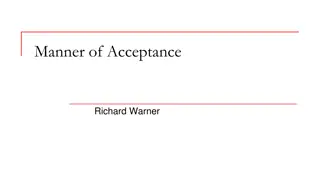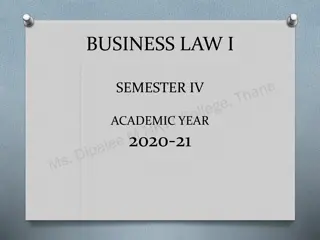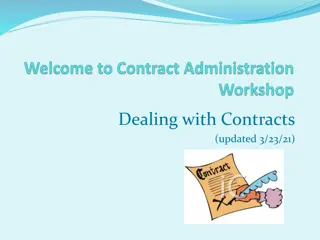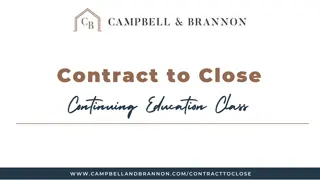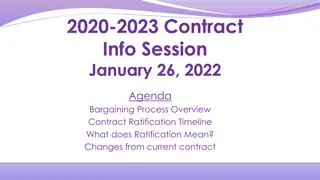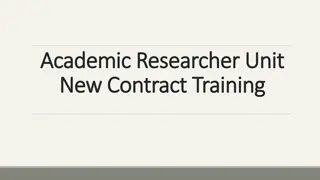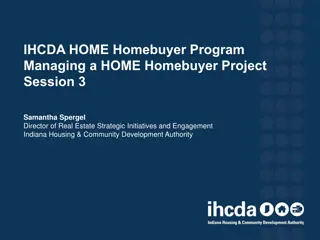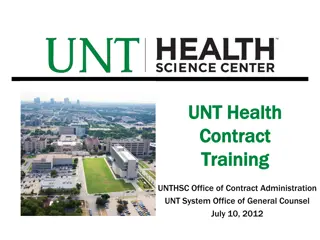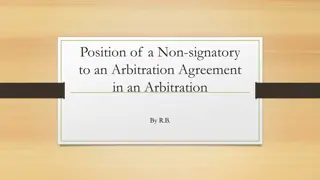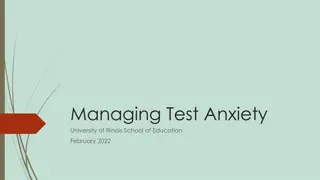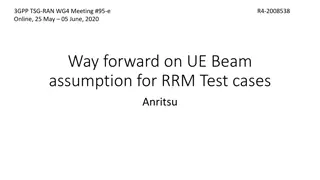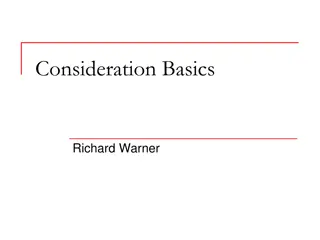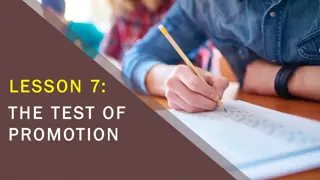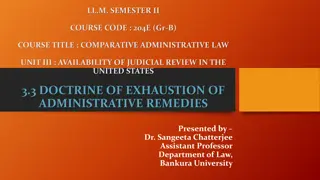Understanding the Objective Intent Test in Contract Law
This content explores the concept of the objective intent test in contract law through legal cases and non-legal examples. It discusses promises, misunderstandings in non-legal situations, and the legal rule surrounding interpreting words and actions as a promise. The analysis of whether a question called for a yes or no answer and the need for an immediate response are also covered.
Download Presentation

Please find below an Image/Link to download the presentation.
The content on the website is provided AS IS for your information and personal use only. It may not be sold, licensed, or shared on other websites without obtaining consent from the author. Download presentation by click this link. If you encounter any issues during the download, it is possible that the publisher has removed the file from their server.
E N D
Presentation Transcript
The Objective Intent Test Richard Warner
Embry v. Hargadine-McKittrick Dry Goods Embry called on McKittrick, in the latter's office, and said to him that as [his] written employment had lapsed eight days before, and as there were only a few days between then and the 1st of January in which to seek employment with other firms, if respondent wished to retain his services longer he must have a contract for another year, or he would quit respondent's service then and there. That he had been put off twice before and wanted an understanding or contract at once so that he could go ahead without worry . . . That McKittrick then said: Go ahead, you're all right. Get your men out, and don't let that worry you. " Are McKittrick s words a promise of employment?
Start With Non-Legal Contexts Marriage vows: Do you Alice take Bob to be your lawfully wedded spouse, to have and to hold from this day forward, for better, for worse, for richer, for poorer, in sickness and in health, to love and to cherish, until death do you part. Alice says, I do. She promises even though she did not utter the words I promise to take Bob . . . A similar question in Embry: Does McKittrick promise employment when he says Go ahead, you re alright . . . ?
One More Non-Legal Example We are discussing whether I will come to the party you are having next week. You say, Do you promise to come? I reply, I intend to be there. You interpret me as promising to be there. When you complain that I broke my promise by not showing up, I claim you misunderstood. I did not promise. Am I right?
Misunderstanding Non-Legal Situations I intend . . . No promise Promise You Me
The Legal Rule The objective intent test: if a reasonable person would, in the circumstances, interpret the words and actions as promise to do X, the words and actions are a promise to do X.
The Legal Analysis Did Embry ask a question that called for a yes or no answer? (a) Yes (b) No
Immediate Need Did Embry have good reason to insist on an immediate answer? (a) Yes (b) No
Did He Get An Affirmative Answer? Would you call Go ahead, you're all right. Get your men out, and don't let that worry you an affirmative (yes) answer. (a) Yes (b) No
The View Of A Reasonable Person Would a reasonable person, in the circumstances, interpret the words Go ahead, you're all right. Get your men out, and don't let that worry you as a promise of employment? (a) Yes (b) No
The Reasonable Person Promise Go ahead . . . No promise Promise The reasonable person. Embry McKittrick
The Rule The objective intent test: if a reasonable person would, in the circumstances, interpret the words and actions as promise to do X, the words and actions are a promise to do X.
Possible? Imagine McKittrick is preoccupied with work. When Embry asks him about his future employment, Embry says without thinking about it Go ahead, you're all right. Get your men out, and don't let that worry you." Embry says he just meant Go ahead, you're all right. Get your men out, and don't let that worry you." Is it possible that he could be right?
Rationales For The Rule To avoid deceit. Suppose in Embry, McKittrick intended to deceive Embry into thinking he had a contract. His plan: To say, Go ahead, you're all right. Get your men out, and don't let that worry you. To claim later, I did not intend to promise employment by saying that. If the court applies the objective intent test, will McKittrick s plan work? (a) Yes (b) No
The Tort of Fraud Why isn't this enough protection for Embry? Elements of Fraud: (1) D makes a false statement of material fact [or conceals a material fact where there is duty to reveal, or promises without intent to perform]; (2) D knows the statement is false; (3) D intends to deceive P; (4) P justifiably relies on D's statement; (5) P is damaged by P's reliance.
Proof Difficulties Fraud can be hard to prove (could Embry prove knowledge and intent?) Pleading requirements may require more factual pleading, so a motion to dismiss is easier to win.
Another Rationale Preventing Negligence. Suppose without thinking-- McKittrick negligently says Go ahead . . . He did not but should have realized that Embry would see this as a promise and rely on it. Not enforcing contract is unfair to Embry. Enforcement does does not let neglienge talker out of contractually liablity just by saying, Oh, I did not mean that".
Fiesta Pizza 1 John works for Fiesta Pizza as a waiter. His contract expires on Friday. John has made several attempts to get the owner of the restaurant to say whether or not he will renew John's contract, but the owner has been non- committal every time. Finally, in the middle of the crowded breakfast time, John corners the owner and demands an answer; he says he has another job offer and he has to let them know today. The owner says, "I can't afford to lose my best waiter; go ahead and work." John works his shift and turns down the other job since he assumes he has a job at Fiesta Pizza. On Friday, the owner refuses to renew John's contract. Did the owner promise employment? (a) Yes (b) No
Fiesta Pizza 2 Before talking to him during the crowded breakfast time, John overhears the owner explaining to his wife on the telephone that he has no intention of renewing John's contract. John corners the owner and demands an answer; he says he has another job offer and he has to let them know today. The owner says, "I can't afford to lose my best waiter; go ahead and work." John works his shift and turns down the other job since he assumes he has a job at Fiesta Pizza. On Friday, the owner refuses to renew John's contract. Did the owner promise employment? (a) Yes (b) No
Sowle and Brill Steve Sowle directs and hosts, Sowle on Soul, a TV talk show. Sowle happens to meet Hal the Blues man Krent, a famous blues singer, on the street, and they began to discuss the possibility of Hal appearing on Sowle on Soul. Sowle thinks it will be interesting to broadcast the show live from Warsaw, Poland. Hal agrees, and says, So what will I get paid for appearing on your show? I would like $10,000. Sowle says, I promise to pay you an amount equal to $10,000. Sowle pays Hal $10,000 in Polish currency. Hal had previously appeared on Sowle on Soul three times when the show was broadcast from a foreign location: once in Kiev, Ukraine; once in Beijing, China; and once in Bangalore, India. He was paid respectively in Ukrainian, Chinese, and Indian currency. Despite this pattern, Hal assumed that $10,000 meant payment in US currency. Did Sowle breach his promise? (a) Yes (b) No
Sowle and Heyman Steve Sowle is the manager and lead singer of the band, Sounds of Sowle, which specializes in the big band sound of the 1940s. The band has just produced its first CD, Sowle First. Sowle is contacted by Steve, Hey, Man, Heyman of Heyman s Hang Out. Heyman says, I will pay you $5000 for one night to perform at Heyman s Hang Out to sing your Sowle music on December 7. Sowle responds by saying, That s a deal. Heyman happens to think Sowle music means rhythm and blues, not the big band sound Sowle thought Heyman meant. Neither Sowle nor Heyman was aware of the misunderstanding. The Sowle Sounds band is very popular, and Heyman hired them because of that. He does not really care what kind of music the band plays. When Sowle played big band music, did he breach his promise? (a) Yes (b) No
Relevant trade usage? No Yes Objective intent test adequately resolves any ambiguity? No Presumption is to interpret in accord with trade usage Yes Use objective intent test Misunderstanding? Yes No One party knows or should know of the misunderstanding? Main purpose of the contract can be determined? No Yes Yes No No contract under Restatement 201 note this may not be the result you want Interpret against party with knowledge, etc. Use hypothetical intent test Use other strategies
Objective intent test adequately resolves any ambiguity? No What happens when the answer is no? Yes Use objective intent test Misunderstanding? Yes No One party knows or should know of the misunderstanding? Main purpose of the contract can be determined? No Yes Yes No No contract under Restatement 201 note this may not be the result you want Interpret against party with knowledge, etc. Use hypothetical intent test Use other strategies
Raffles v. Wichelhaus Raffles v. Wichelhaus: It was agreed between the plaintiff and the defendants. . . that the plaintiff should sell to the defendants, and the defendants buy of the plaintiff . . .125 bales of Surat cotton . . . to arrive ex Peerless from Bombay . . . [T]he . . . goods did arrive . . . and the plaintiff was then and there ready and willing and offered to deliver the said goods to the defendants . . . [T]he defendants refused to accept the said goods or pay the plaintiff for them. There were two ships at anchor in Bombay (now Mumbai) at the time the contract was made. The ships had different sailing schedules. The seller claims he meant the ship with the later sailing schedule; the buyer claims he meant the ship with the earlier sailing schedule. On which ship did the seller promise to deliver the goods?
An Ambiguity Could be early Could be late Peerless Early Peerless Late Peerless The reasonable person.
Ambiguity Or Not? Steve Sowle owns and operates Sowle s Seoul Soul, a restaurant specializing in a Korean interpretation of soul food. On May 10, Sowle is negotiating with Brill s Food, a food importer, for the delivery of soybeans and collard greens. What about selling me 50 pounds of chitterlings and 100 pounds of hog maws? Delivered along with the collard greens and soybeans. Payment to be at the market price prevailing today. Brill agrees.Chitterlings are pig intestines, and hog maws are pig stomachs, but Brill, unfamiliar with soul food terms, thinks that chitterlings are pig stomachs, and hog maws are pig intestines. Brill later delivers 100 pounds of pig intestines (chitterlings) and 50 pounds of pig stomachs (hog maws) instead of 50 pounds of pig intestines (chitterlings) and 100 pounds of pig stomachs (hog maws). What did Brill promise to deliver? (a) 100 pounds of pig intestines (chitterlings) and 50 pounds of pig stomachs (hog maws). (b) 50 pounds of pig intestines (chitterlings) and 100 pounds of pig stomachs (hog maws).
An Ambiguity? Hog maws. Pig stomachs . Pig intestines . Brill Sowle
Promise for Pig Stomachs Pig stomachs. Hog maws. Hog maws. Pig intestines. Pig stomachs. The reasonable person.
The Chicken Case Frigilament, a Swiss company, orders chickens from Chickens R Us, a US company. The contract does not specify whether the chickens are to be young, tender, expensive fryers, or old, tough, cheap boilers. Frigilament intends to order fryers, but the price quoted is the price for boilers. Neither side discusses the issue. Frigilament is new to the chicken business. There is no relevant trade usage as to the term, Chicken. Chickens R Us ships boilers; Frigilament refuses to accept delivery. Chickens R Us promised to ship (a) Fryers (b) Boilers
The Jazz Club Promise John, a jazz guitarist, has a contract with Jazz Club to perform for one week. In the contract, Jazz Club stipulates that John is to play jazz that is currently the most popular. John and The Jazz Club believe that this includes music from Ricky Smyth, Don Waters, and The Saxophones. Neither party mentions these performers in the contract, and neither party really cares what music is played as long as it is the currently most popular. Subsequent to forming the contract, several new performers have come on the scene and have skyrocketed in popularity. John believes that these new songs are currently the most popular. When John steps on the stage and starts performing songs from this new act, the management of The Jazz Club immediately shuts off the electricity to the stage and tells John that the music he is playing is not what he promised to play. (a) The owner is correct. (b) The owner is not correct.
What Order? In Embry v. McKittrick, in what order would you apply these rules? (a) Consideration, promissory estoppel, objective intent. (b) Promissory estoppel, objective intent, consideration. (c) Objective intent, consideration, promissory estoppel. (d) Not sure.
